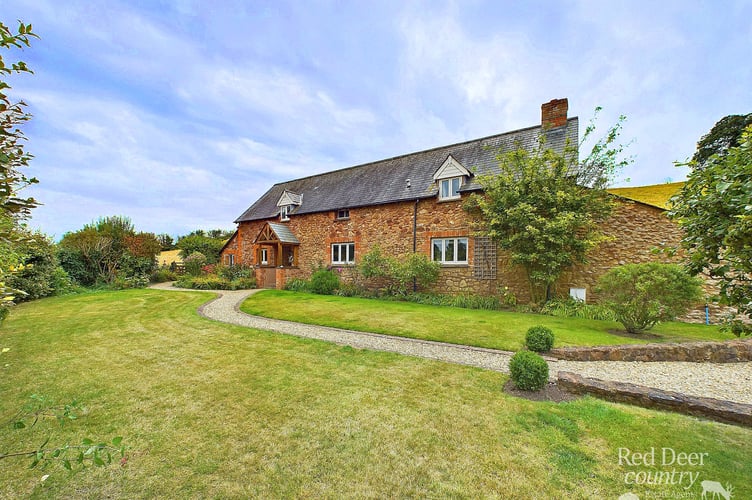WITH Greensdale Taylor Hunt in Williton closing their doors for the final time last week, and Webbers in Dulverton doing the same back in the summer, it begs the question – is the end of traditional high street agency in sight?
Perhaps dramatic, but there is certainly a shift happening within the industry. In this article I explore the rise and fall of online estate agents and the struggles that traditional high street agencies are facing, writes Zoe McCanlis, director at Red Deer Country.
The internet has revolutionised the way we buy and sell houses with most people now using it as their first and main port of call when considering a move. Rightmove recently carried out a survey finding that 96 per cent of people find their next house online – a staggering figure when you consider that, not that many years ago, people were still physically visiting multiple estate agencies or browsing property brochures in high street windows.


In many ways, this digital shift has been great for the property market, providing a wealth of information to buyers at their fingertips. Online platforms such as Rightmove, Zoopla, and On The Market allow buyers to filter listings, view images and videos, and even take virtual tours – all without leaving their homes.
The internet has streamlined the property buying process, reducing the need for time-consuming viewings of unsuitable properties. However, as the online property market grew, so did the number of online estate agents offering significantly reduced commission rates and stripped-back services.
In theory, the appeal is clear: if we can conduct most of our financial transactions online, why not real estate, too? With fewer physical banks and insurance brokers on the high street, why should estate agents be any different? With all the technology and information available to us, surely, we can ditch the high street office and pass those savings onto the customer?
The problem comes as soon as you are faced with anything unusual or tricky, these online ‘experts’ don’t know the area and can’t offer any practical advice on tradesmen, solicitors, etc. Most of these firms also charge an upfront fixed fee so you can forget any customer service once they have gained your instruction.
Contrary to what some may think, most of the work as an agent starts once you have agreed the sale, keeping a chain together can be hard work and a strong network of local contacts can be the difference between completing or not completing on a sale.
In response to the challenges faced by online agents, several ‘hybrid’ models have emerged in recent years. A local person offering essentially the traditional estate agency service but without a team of people or a high street presence. It’s certainly an improvement on the exclusively online firms but I don’t believe it is the answer.
West Somerset is an older demographic and with that, generally, comes less confidence surrounding technology. Especially in the more rural areas, some of my clients don’t even have an email address, let alone the ability to print anything off or do an ID check on an app.
These people need an office, somewhere where they can come to get help with the never-ending paperwork that comes with selling a house these days and somewhere where they can still pop in and pick up a hard copy brochure. In areas like West Somerset, the personal touch still holds great value.


Historically, agents have required multiple offices to build a large database of contacts in order to advertise their properties.
For example, Savills, which has 160 offices nationwide, proudly claim their website gets three million hits a month. Now let’s put that into perspective. Rightmove gets 140 million visits a month, Zoopla 45 million and On The Market 42.2 million.
The reach that the online platforms have far outweighs any number of hits to an individual firm’s website, whether you have one office or 1,000. Now, the ‘big boys’ of estate agency obviously have access to all of those portals, yet the Property Industry Eye reported earlier this year that ‘The UK’s high street sales and letting agents suffered almost 5,000 branch closures in 2023, as many agency brands disappeared or merged amid challenging economic conditions.’
In the same report, Katy Billany, executive director of TwentyEA, commented: “With a slowing property market and squeezed wallets, you might assume that sellers would opt for the most cost-effective estate agent fee, but this wasn’t the case. Instead, we saw cautious buyers and sellers embrace the expertise of traditional estate agents during such a turbulent economy, and thus market share for online/hybrid agents fell.”
So, with the shift coming back towards traditional agency again, why have so many larger firms closed or merged branches? My view is that many buyers today care less about the name on the door and more about the service they receive. The promise of a national network or the prestige of a London office no longer holds the same appeal.
What matters now is the experience of the agent and their ability to provide excellent service and strong local connections. The larger firms that once dominated the high street are finding it increasingly difficult to maintain this outdated business model.
What is my conclusion? The industry is changing, and I can see a time in the not-too-distant future where there are more home-based agents, but I strongly feel that the good high street agencies are here to stay and will continue to serve their local communities.
Red Deer Country have been covering West Somerset from one office for nearly 11 years now. We were ahead of the curve when we set up, but I feel we are now well placed to embrace the change happening within the industry. We can reach the same audience as any national firm but with the personal care and attention that comes with an owner run independent agency.




